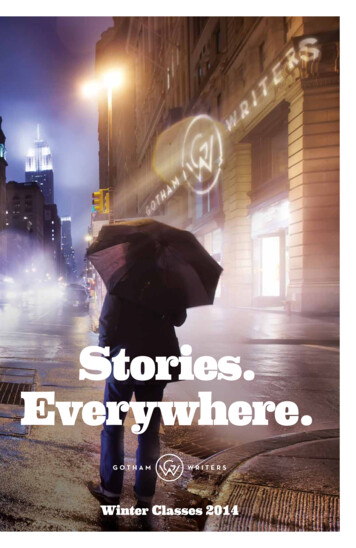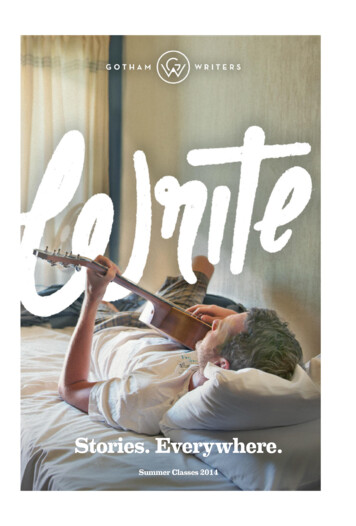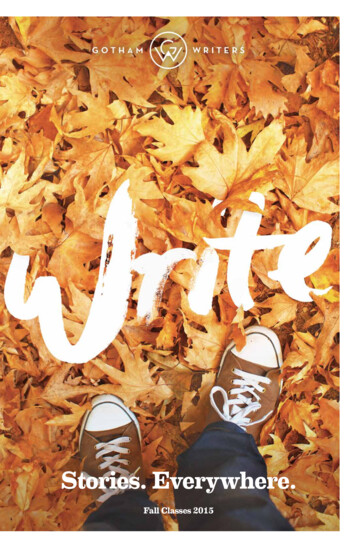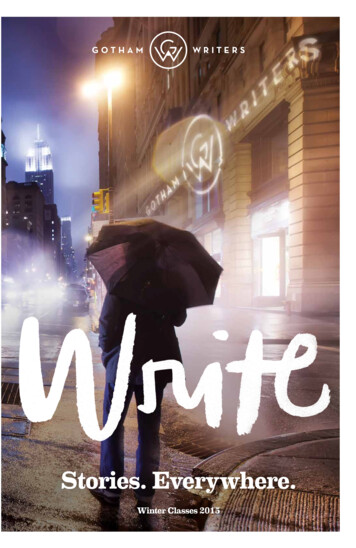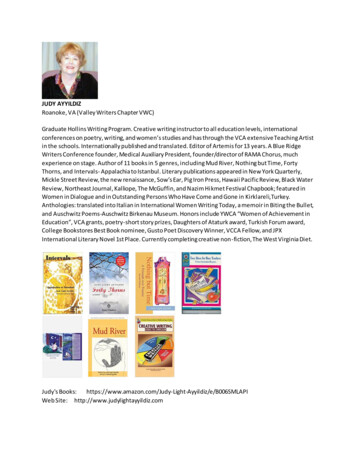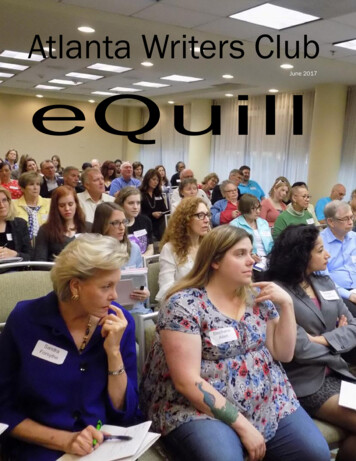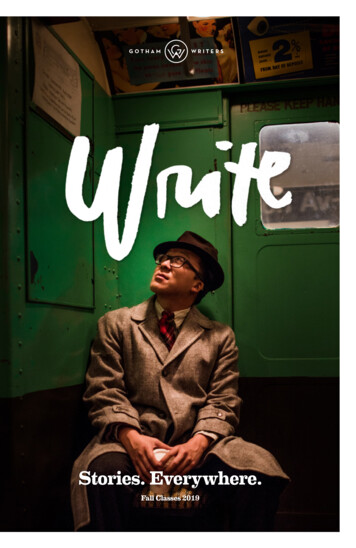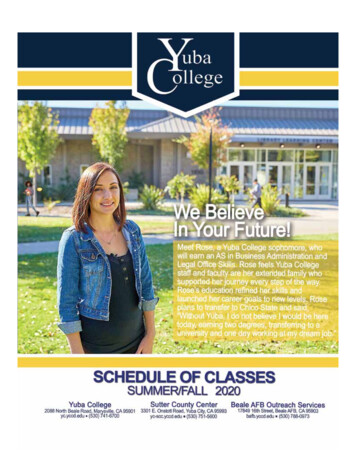
Transcription
Stories. Everywhere.Summer Classes 2015
W E WA N T Y O U R S .Gotham Writers Workshop is a creative home in New YorkCity and online where writers develop their craft and cometogether in the spirit of discovery and fellowship. We’ve beenteaching creative writing to students since 1993.We believe that everyone has a story to tell. Indeed, manystories. Keep your eyes and mind open and you will find themeverywhere. And we can help you tell your stories better.Photo: Derek MidgleyWhether you’re a new writer looking to explore, or anexperienced writer looking to strengthen your skills, ourclasses will help your reach your goals—through clearinstruction on elements of craft, critique in a safe environment,and a structured process that keeps your work on track.GOTH AMWRIT E RS .COMtwitter@GOT HAM W RI T ERSCO N TACT@GOT HAMW RI T ERS .CO MWe also teach Business Writing, with the same verve andexpertise we bring to our creative writing courses.We strive to give each student the best possible learningexperience. Class size is strictly limited so you never get lost in acrowd. And our instructors are consistently excellent—workingwriters who are as skilled at teaching as they are at writing.We are invested in helping students find the writing class thatis most appropriate for their particular needs. Explore ourwebsite, and feel free to discuss options via email or phone.Thousands of people have been enriched by the Gothamexperience. It’s why we’ve been around for over twenty years.2 12–974 – 837 7
CoursesWays to LearnFictionNonfictionScriptwritingComedy, Poetry & SongWhether delving inside the truth ofour everyday lives or letting us escapeinto entertaining page-turning, fictiontakes us through the “looking-glass”into a world that’s a curious mixtureof real and made-up.Whether it’s an experience foundin your kitchen or halfway aroundthe world, whether it’s an idea youcan’t forget or a conversation with afascinating person, sometimes themost intriguing stories are true.We all like to be entertained,whether it’s watching aperformance live on stage orflickering on a screen. Here’swhere you learn to write thematerial that holds thoseaudiences in thrall.Send words soaring in the lyricismof poetry or song. Or get peoplehigh on laughter through stand-upcomedy or humorous prose.FICTION/NOVELCREATIVE NONFICTION 101CHILDREN’S BOOKSMEMOIRDRAMATIC WRITING 101SCIENCE FICTION & FANTASYESSAY & OPINIONSCREENWRITINGMYSTERYPERSONAL ESSAYTV WRITINGROMANCEARTICLEPLAYWRITINGCOMICS & GRAPHIC NOVELSTRAVEL WRITINGDOCUMENTARY FILMREADING FICTIONFOOD WRITINGSCRIPT ANALYSISIn-person classes in NYC.Online classes draw togetherwriters from across the globe.NYC CLASSES BEGIN THROUGHOUTJUNE, JULY, AND AUGUST.MANY OF THEM BEGIN THEWEEK OF JULY 6.POETRYSONGWRITINGONLINE CLASSES BEGIN THROUGHOUTJUNE, JULY, AND AUGUST.HUMOR WRITINGSTAND-UP COMEDYVIDEO GAME WRITINGEssentialsProfessional DevelopmentTeen ClassesOne-on-One10 -Week Workshops6-Week ClassesSelling SeminarsIntensivesCreative Writing 101 is an idealstarting point for writers, to testthe waters or wash off the rust.The other courses here focus oncrucial aspects of the writing craft,useful for all types of writing.These courses sharpen your skillsin the workplace, or help youbuild a platform as a writer, orguide you through the tricky taskof publishing your work. We alsooffer Corporate Classes.Pressure-free, creativity-stretching,not-like-school courses for writersages 13-17. Useful for expandingyour talent or gaining skills boundto help with essays and schoolwork.It’s wonderful to learn in a groupsetting, but sometimes one-on-oneis the right match. You may wanta private class, or “doctoring” on aspecific project, or a professionalmentor to guide you, or one of ourspecialty arrangements.These classes use a combinationof lectures, exercises, andworkshopping (critiquing of studentprojects). In New York City, theymeet for three hours per week;online, each session begins at thesame time each week, and unfoldsgradually all week long. Available inLevel I, II, III.These classes let students explorea variety of forms and concepts ina low-pressure manner, througha combination of lectures andexercises. In New York City, theymeet for three hours per week (twohours for Business Writing); online,each session begins at the same timeeach week, and unfolds graduallyall week long. (Timing and price isdifferent for Business Writing.)All Level I.These courses emphasize thebusiness side of writing. The NewYork City versions take placeover two three-hour sessions. Theonline versions take place overfour weeks. All Level I.In NYC, these are seven-hourcrash courses, taking place all inone day. The online versions takeplace over three weeks. All Level I.UNBOUND: CREATIVE WRITINGCREATIVE WRITING 101BUSINESS WRITINGTRUE STORY: CREATIVE NONFICTIONCHARACTERHOW TO BLOGWRITE IT RIGHT!: GRAMMAR FOR TEENSDIALOGUEHOW TO GET PUBLISHEDMENTORSHIPSWRITE IT RIGHT! (GRAMMAR)NONFICTION BOOK PROPOSALPRIVATE SESSIONS AND CLASSESTHE WRITER’S MINDHIT SEND: PUBLISHING SHORT NONFICTIONPRIVATE GRAMMAR SESSIONSDOCTORING— BOOK/STORY/SCRIPTTHE EDITOR’S EYEPRIVATE BUSINESS WRITING SESSION/CLASSIN(VERSE): POETIC TECHNIQUES FORCOLLEGE ESSAY COACHINGNON-POETSMFA APPLICATION ASSISTANCE 425 — NYC 400 — Online 125 165 315 — NYC 300 — OnlinePROMPT-A-THONONLINE VIDEOSOCIAL MEDIARegistration fee for all classes: 25 paid once per term.GOTH AMWRIT E RS .COMtwitter@GOT HAM W RI T ERSCO N TACT@GOT HAMW RI T ERS .CO M2 12–974 – 837 7
Illustration: James Anzalone
Gotham FacultyStudent VoicesSIX TIPS FOR WRITING YOUNG ADULT NOVELSFaculty InsightBY NORA RALE IGH BASKI NI didn’t start out writing for children. Like many of my fellowyoung adult/middle-grade authors, I spent quite a few years(five) writing adult fiction before getting published. Then awell-intentioned woman in awriting course made the unwelcome suggestion that I considerwriting for children. Hey, justbecause I wrote about childrendidn’t mean I was relegated towriting for children.But after a good cry, I wenthome and gave it a try. I soonbegan getting my first handwritten, personal—and helpful—rejections. It took a lotof work, a couple of Societyof Children’s Book Writers &Illustrators conferences, anda children’s writing critiquegroup until I finally found theright combination of what hadbeen brewing inside me.Here are six lessons I learnedabout writing for young adults:Point of ViewGet the POV right. I don’t justmean first person or secondperson, but from what point intime is your narrator speaking?In writing for young adults, donot write as an adult lookingback. The perspective needsto be immediate. A teenagecharacter can look back on hisyounger years, but he cannothave an adult’s wisdom gainedfrom hindsight. This is harderthan it seems. It requires truly putting yourself in the teenage mind and often not caringmuch at all about the grown-upworld.AgeMake sure your character’sage suits your audience. Theage of the protagonist in YAnovels will likely be the age ofyour intended reader. Kids willread up but not down; they willpick up a book about a kid afew years older than they arebut not the other way around.Therefore, middle-grade novelstend to deal with middle-schoolage characters and young-adultnovels deal with high schoolage characters.However, most high-schoolstudents read adult books, sothe real audience for YAsis seventh-, eighth- andninth-graders. The importantthing, again, is not to have anadult perspective, not to “lookback” and reflect on the emotion or the situation. Your character needs to learn, grow, andchange during the course of thenovel from the events she is experiencing in the book. (This ishow YA novels differ from novels for adults that feature an adolescent protagonist.)Voice/LanguageFigure out the voice, and thelanguage will follow. Sentencestructure, vocabulary, andeven plot structure in a middle-school novel will be morecomplex than a chapter book,but perhaps not as complicatedas a YA.Do not dwell on this whilewriting your first draft, though.Find the right voice, and theright language will follow. Ifyou have to consider if a wordor sentence structure is right foryour book, chances are you haven’t nailed the voice yet. Don’ttalk down to your reader. Thereis very little (if any) differencein the language of a YA novelthan an adult one.Touchy SubjectsDon’t shy away from touchysubjects. Pretty much any issue goes these days in terms ofwhat is appropriate for youngadult fiction. As a general rule,middle-grade fiction will not actively involve sex or drugs. Foryoung-adult novels, there are nobounds in terms of topic; youcan write about sexuality, homosexuality, abuse, drunk driving, incest, or rape. But it is notabout finding an issue and thencreating a story around it. It isabout finding the right voice,finding the right character, andtelling his story.PreachinessDon’t get preachy. “If you wantto send a message, call WesternUnion.” This quote, often attributed to Samuel Goldwyn,says it all. Nobody wants to betaught lessons when they arereading fiction. Never is thistruer than in writing for youngadults. Writers do not need toanswer questions, only raisethem. Certainly your viewsTom Brennan teaches Gotham’s Comics & GraphicNovels One-day intensive, but much like Clark Kent/Superman, he embodies more than one identity.“What I’m teaching at Gotham is that comic booksdon’t always have to be about a superhero,” Tom says.“Action and adventure-themed stories defined thegenre because they had great designs that allowedfor the illusion of movement. But we can also makea compelling image of two people having coffee andreach a broader audience.”After his first year as an editor at Marvel Comics, theonly criticism Tom received was that he needed toimprove his presentation skills. His boss suggestedtaking an acting/improv class and so, Tom enrolledin classes at New York hotspots like Upright Citizens’Brigade (UCB) and soon bonded with a colleague hemet during one of the shows.TOM BRENNANFaculty ProfileBY BRIT T GAM BI NOThey realized they were both political animals (hiscolleague having served as a speechwriter for NewtGingrich), and decided to try out a twenty-minuteimprov show based on current news events. Theirshow, Electoral Dysfunction, became so successfulthat it became a weekly event at the Peoples ImprovTheater (PIT) in New York City. “We’re popular withboth liberals and conservatives,” Tom says. “Theshow attracts a great group of people, all from diversebackgrounds.”and opinions will peek throughyour narrative, but do not enterthis special contract betweenreader and writer with the intention of changing someone’smind or preaching. Teenagershave radar for this, and thevoice will feel inauthentic because—well, it will be.Hopeful EndingsWrite hopeful endings. For themost part, young-adult novelistsleave their readers with hope, ifonly a glimmer, despite whatever grim action came before.Adult novels, while dealingwith the same issues, can leavea reader utterly sad, even completely bereft. But in writing foryoung adults there still seemsto be a sense of responsibility—not to drill in lessons and givewarnings, but to allow for possibility. Let your readers believethat in the end the power, thechoice, is theirs.This article first appeared inThe Writer magazine. NoraRaleigh Baskin is the authorof numerous middle-gradeand young-adult novels.Having worked in the comic book industry for nearlya decade, Tom has seen many stereotypes shattered.For example, while he has edited popular series,such as the Avengers, X-Men, Wolverine, and SpiderMan, not every comic book features the classic superhero/villain trope. Now there are memoirs in theform of graphic novels like Alison Bechdel’s FunHome. He finds that comic books serve the genrewell. “Our memories are skewed. Things that weregigantic when you were a kid no longer are. Color,objects, locations, etc.—visually, everything changes.”Plus, Tom adds, “It’s terrific for the medium to getattention by people who might not have otherwiseread comics.”Fortunately, Tom has the opportunity to directly impact what’s published. After editing at Marvel for seven years, Tom went on to do a bit of freelance work.But once he got engaged, he decided to pursue a fulltime gig again, this time at Valiant Entertainment(founded by two former Marvel Comics writers/editors). As an Associate Editor, one of Tom’s goals is tocultivate a new audience, and to change up and getcreative, even on series that have built-in fan bases.As he points out, “Comics are on the same rackas the National Inquirer—and sometimes, they getdismissed in the same way.”When he’s not teaching or editing, Tom is at work“on some funny (but not offensive) marriage vows.”“I was really proud when I came up with it [thename, Electoral Dysfunction],” Tom says. “But thenI found out it was actually a book and documentary.Fortunately, the author came to our show and loved it!”“I owe all my success toGotham Writers and mywonderful instructor. Thankyou for helping to makemy dream of becoming apublished writer come true.”“The students were inspirational, fromdifferent age groups with differentbackgrounds. The class atmospherewas open and welcome for anyone toexpress his or her opinion.”—Takako Sato, real estate broker—Steve Hagood, writer“I feel ignited by what Inow know, and hopefulthat I will continue towrite and learn.”—Helen Merino, dog handler“Gotham has found the perfectbalance of freedom, knowledge, insight, and support.—Mariana Frias Vega, audio engineer“The teacher is a joyful andenergetic raconteur whoentertains, educates, andalways encourages. He isthe Big Bang of ideas.”—Michael Bennett, rehabilitation physician“The best investmentI’ve made as a writerthus far.”—Tiffany Baugh, bank tellerGOTH AMWRIT E RS .COMtwitter@GOT HAM W RI T ERSCO N TACT@GOT HAMW RI T ERS .CO M2 12–974 – 837 7
CommunityWrite NowThe Movie of Your Life ContestMOVIEOF YOURLIFEWRITE-INSDo you wish there was a place you could go for writinginspiration and practice? Where you could hang out with otherwriters? Without needing to make a long-term commitment orspend a lot of money? With food and drink involved?Gotham Write-Ins are that place.HERE’S WHAT HAPPENS: The teachergives an interesting writing prompt.Everyone writes for a while. Then,those who want to read aloud theirwork. You take a break and socialize over refreshments. Then you gothrough the process one more time.Then you socialize a little more. It’stwo hours of writer’s heaven.You can sign up in advance orjust drop in.FRIDAY EVENINGS IN MANHATTAN6:30–8:30pmWe also want a tagline to go with thetitle—a pithy sentence hinting at ortelling us what the movie is about.selors of the Galaxy or A Food CartNamed Desire. We want originality.For inspiration, here are someexamples:A Little Off the TopOne man’s struggle with malepattern baldness.Meow and I’ll Meow BackWhoever comes up with the title/tagline that makes us laugh the mostwins a free class.A story of a girl and her roommate’s cat.This will probably work better ifyour movie focuses on an aspect ofyour life rather than your whole life.And try to avoid using a spoof of anexisting title such as Guidance Coun-Another actress searches forstardom in the big city.Love Me Please!But we know you can do even betterthan this!For competition rules and online entry form,— visit —G OT H A M W R I T E R S .C O M / MOV I E L I F E 20 per sessionALITTLEPUSHSee our website for details.FREE EVENTSWe do free classes and other fun thingsaround New York City—at bookstores, bars,Bryant Park, etc. It’s our way of showcasingwhat we do and getting to know you. See ourwebsite for upcoming events.GOTH AMWRIT E RS .COMThis summer, a movie based onyour life is hitting theaters. Well,okay, pretend that this is true. Comeup with a title for this movie. Here’sthe deal, though. This is a comedy,and we want funny titles.twitter@GOT HAM W RI T ERSCO N TACT@GOT HAMW RI T ERS .CO MSometimes all you need is a little pushto write a good story. So let’s give you apush. Write a story that begins withthis sentence:THE ONE THING IN E V E R WA N T E D T OH E A R WA S . . .2 12–974 – 837 7
#storieseverywhereStories are, truly, everywhere—every placeyou look, everyone you meet, everythingyou experience. Every day is filled withhundreds of potential stories awaiting yourimagination and craft.Each month we invite you to post a story on Twitter at#storieseverywhere. Your stories (which can be true or made up) willbe inspired by what you see, know, or do, and they should relate in someway to these monthly “themes”:juneWaterjulyTorrid affair.augustA dog's life.At the end of each month, we will pick our favorite and reward thatperson with a free Gotham writing class.Your story must be no longer than 140 characters, including spaces andthe hashtag #storieseverywhere. Here is a previous winner, using thetheme Through a window:Staring straight ahead, I see his thumb raise. I reciprocate. It is the onlyway he knows I’m alive inside this ambulance. #storieseverywhere(by @Abranyc)Everyone has a story. Especially you.gothamwriters.com212–974–8377
Gotham Writers Workshop is a creative home in New York . writers develop their craft and come together in the spirit of discovery and fellowship. We’ve been teaching creative writing to students since 1993. We believe that everyone has a story to tell. . tend to deal with middle-school
